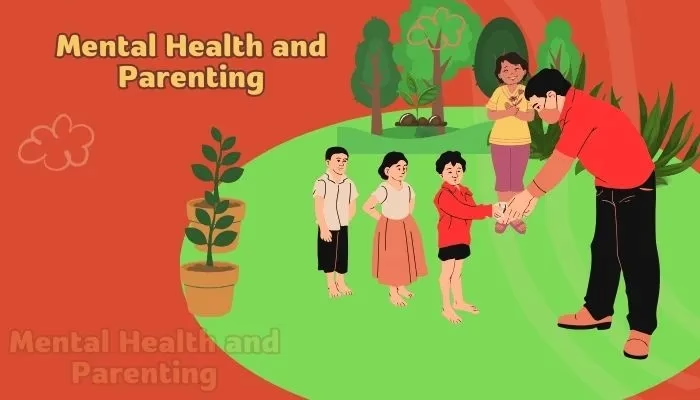
Parents are one of the most comfortable for lives, and its effects on mental well-being are deep. The connection between mental health and parenting is deeply associated, as emotional stress can build how parents care, connect, and talk with their children. From night to night -sleep, from the emotional language, it is necessary to keep psychological welfare for a diet at home. Therefore, it is important to understand how mental health and upbringing are affected by each other, it is important to create strong families.
Mental Health and Parenting: Nurturing Families with Emotional Strength
Mental Health and Parenting: Emotional Pressures in Early Parenthood
The early stages of paternity have serious emotional adjustments. Deficiency of sleep, hormonal changes and increased responsibility can affect parents’ mood and ability to compete. Therefore, it is important to show signs of emotional stress to ensure both parents and children.
- Depression of delivery is common and can affect both parents. This cannot take into account anyone because of focusing on a newborn, but has a permanent effect when not treated.
- Deficiency of personal time often increases anxiety and irritability. Even small daily self-care habits can decrease emotional overload.
- Emotional burnout may affect bonding and communication. Parents may feel disconnected despite their love, making emotional awareness essential.
- Parents with unsolved problems might struggle more with emotional changes. Treatment or support teams can help break the generational cycle of distress.
As a result, nurturing mental well-being during early parenthood lays the foundation for emotionally secure families and long-term psychological health.
Mental Health and Parenting: Balancing Work and Family Life
Balancing career responsibilities with parenting duties frequently disturbed caretakers. Stress of multitasking, completing the time limit and emotionally present at home can increase the stress. Moreover, constant balancing with other parents on social media frequently provides self -confidence. Working parents frequently face guilt over time used by children. However, open communication and quality time matter more than constant presence.
- Lack of support systems can intensify emotional fatigue. Seeking help from family or professionals can ease the daily load.
- Mental stress affects the quality and emotional appearance of parenthood. Kids are very sensitive to their parents’ emotional readiness.
- A stressful work environment can cause irritability at home. .
- Building up the limits of the permanent working life can protect the family.
Constant, it is important to find a balance between work and home to maintain both creativity and emotional mental health in parenting.
The Role of Support Networks
A strong help set up plays an important role in helping parents get on with emotional stress. Whether it’s a partner, friend, doctor, or parenting workshop, having someone to talk to decreases the mental load. In fact, shared stories create comfort and a feeling of relation.
- Emotional support from a partner enhances parenting confidence. Joint duty in guidance decreases negativity, pressure, and promotes teamwork.
- Professional counseling helps manage anxiety or depression. Treatment can also improve talking between parents and children.
- Parent groups reduce feelings of isolation. These spaces provide practical tips, emotional comfort, and social bonding.
- Shared caregiving responsibilities lighten emotional stress. It reminds parents they don’t have to do everything alone.
Thus, building a helpful connection is a necessary part of controlling mental health and parenting challenges which is effective for long-time well-being.
Raising Emotionally Resilient Children
Children soak up the emotional environment around them. A parent’s mental state can change how children express, control, and understand feelings. Therefore, helping parents’ mental health has a direct impact on increasing emotionally intelligent and flexible children.
- Parents who model calm behavior teach emotional regulation. Children mirror their parents’ responses during stressful situations.
- Open discussions about feelings normalize emotional expression. This decreases stigma and increases kindness in the family.
- Secure attachment builds children’s confidence and trust. Consistent emotional support creates a strong foundation for growth.
- Uncontrolled stress in parenting may cause habitual problems in children. Emotional insecurity frequently guides acting or returning.
Accordingly, emotionally healthy parenting takes care, loving environments where children can grow with self- understanding, and humanity that advantage them for life.
Managing Needs and Challenges
Children with developmental problems or health analysis comes with added emotional weight. Constant care, anxiety and social decisions can increase stress, making mental health care even more important.
- Continuous care can cause chronic and emotional tiredness. Parents often distance themselves from their own health and relationship.
- Isolation from typical parenting groups can lead to loneliness. It’s necessary to look for highly skilled communities for help and validation.
- Parents frequently neglect their own needs due to child-focused routines. Self-care is not self-seeking, it’s necessary for rational guidance.
- External stigma can cause anxiety,stress and low self-worth. Education and defence help challenge common misunderstandings.
Hence, arranging self-care and seeking full time guidance can permit parents to better control both their own emotional well-being and their child’s needs without any guilt.
Mental Health and Parenting: Coping with Single Parenthood
Single parents frequently have a complete emotional and financial load of a child’s upbringing. When you complete, this responsibility may increase emotional stress and feelings of loneliness. In such cases, mindful attention to mental health becomes even more vital.
- Lack of partner help can create emotional overload. Having no backup makes decision-making and stress management harder.
- Time constraints affect both personal care and parenting quality. Single parents frequently ignore their needs and cause tiredness.
- Financial pressure can cause long-term anxiety. Budgeting help and community resources can provide relief.
- Emotional tiredness affects patience and positivity. This can affect the overall mood at home and change the child’s habits.
Thus, for single parents, growing mental flexibility and building community connections is the essential part of permanent parenting and emotional existence.
Mental Health and Parenting: When to Seek Professional Help
Even the most loving, loyal parents may face mental health challenges that need professional guidance. Recognizing the signs of emotional distress can help prevent more serious problems and ensure healthier connection within the family.
- Constant sadness or irritability may indicate depression. Early stepping can prevent long -term suffering.
- Trouble sleeping or eating can reflect emotional overload. These symptoms often go unnoticed amidst parenting routines.
- Difficulty connecting with your child might indicate burnout.Binding can feel like a duty when spiritual power is decreased.
- Extreme anxiety can hinder taking action and presence. Mindfulness and treatment are powerful devices for calming the mind.
Searching for medical or consultation is not a sign of weakness but a step toward powerful, more careful parenting. Every parent deserves to feel emotionally comforted and mentally healthy.
Conclusion: Prioritizing Mental Health and Parenting Together
Journey of parenting is filled with ups and downs, but one truth remains unchanged, emotionally healthy parents take up emotionally healthy children. Understanding the powerful connection between mental health and parenting, a strong guardian to look for balance, help, and healing. When you’re a parent for the first time, navigating needs or handling action and family,it is important to invest in your mental health. As we preserve to control the next technology, allow’s additionally guide us – with patience, feeling and care.
